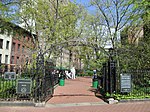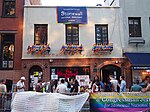The Stonewall riots (also known as the Stonewall uprising, Stonewall rebellion, or simply Stonewall) were a series of spontaneous protests by members of the gay community in response to a police raid that began in the early morning hours of June 28, 1969, at the Stonewall Inn in the Greenwich Village neighborhood of Lower Manhattan in New York City. Patrons of the Stonewall, other Village lesbian and gay bars, and neighborhood street people fought back when the police became violent. The riots are widely considered the watershed event that transformed the gay liberation movement and the twentieth-century fight for LGBT rights in the United States.As was common for American gay bars at the time, the Stonewall Inn was owned by the Mafia. While police raids on gay bars were routine in the 1960s, officers quickly lost control of the situation at the Stonewall Inn on June 28, 1969. Tensions between New York City Police and gay residents of Greenwich Village erupted into more protests the next evening and again several nights later. Within weeks, Village residents organized into activist groups demanding the right to live openly regarding their sexual orientation, and without fear of being arrested. The new activist organizations concentrated on confrontational tactics, and within months three newspapers were established to promote rights for gay men and lesbians.
A year after the uprising, to mark the anniversary on June 28, 1970, the first gay pride marches took place in Chicago, Los Angeles, New York, and San Francisco. Within a few years, gay rights organizations were founded across the US and the world. Today, LGBT Pride events are held annually in June in honor of the Stonewall riots.
The Stonewall National Monument was established at the site in 2016. An estimated 5 million participants commemorated the 50th anniversary of the Stonewall uprising, and on June 6, 2019, New York City Police Commissioner James P. O'Neill rendered a formal apology for the actions of officers at Stonewall in 1969.





